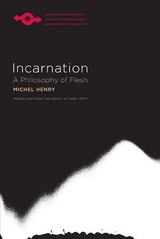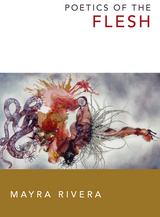2 books about Flesh (Theology)

Incarnation
A Philosophy of Flesh
Michel Henry; Translated from the French by Karl Hefty
Northwestern University Press, 2015
In his book Incarnation: A Philosophy of the Flesh, Michel Henry starts with the opposition of the sensible and living flesh, as we experience it permanently from the inside, to our inert and material body, as we can see it from the outside, similar to the other objects we can find in the world. The flesh doesn’t fit at all in his terminology with the soft part of our material and objective body, by opposition to the bones for example, but to what he called in his previous books our subjective body. For Michel Henry, an object doesn’t possess interiority, it is not living, it doesn’t feel itself and doesn’t feel that it is touched; it doesn’t do the subjective experience of being touched.
After having placed the difficult problem of the incarnation in an historical perspective going back to the thought of the Fathers of the Church, he makes in this book a critical review of the phenomenological tradition that leads to the reversal of phenomenology. He then proposes to elaborate a phenomenology of the flesh which leads to the notion of a not constituted original flesh given in the "Arch-revelation" of Life, as well as a phenomenology of Incarnation.
Although the flesh is traditionally understood as the place of sin, it is also in Christianity the place of salvation, which consists in the deification of man, that’s to say in the fact of becoming Son of God, to come back to the eternal and absolute Life we had forgotten getting lost in the world, caring only about things and ourselves. In the fault, we make the tragic experience of our powerlessness to do the good we would like to do and of our inability to avoid the evil. In this way in front of the magic body of the other, that’s the anguished desire to meet the life in it that leads to the fault. In the night of the lovers, the sexual act couples two impulsive movements, but the erotic desire fails to reach the pleasure of the other where it is experienced, in a total loving fusion. The erotic relation is however doubled by a pure affective relation, foreign to the carnal coupling, a relation made of mutual gratitude or of love. That’s this affective dimension that is denied in this way of violence that is pornography, which extracts the erotic relation from the pathos of life to abandon it to the world, and which consists in a real profanation of life.
After having placed the difficult problem of the incarnation in an historical perspective going back to the thought of the Fathers of the Church, he makes in this book a critical review of the phenomenological tradition that leads to the reversal of phenomenology. He then proposes to elaborate a phenomenology of the flesh which leads to the notion of a not constituted original flesh given in the "Arch-revelation" of Life, as well as a phenomenology of Incarnation.
Although the flesh is traditionally understood as the place of sin, it is also in Christianity the place of salvation, which consists in the deification of man, that’s to say in the fact of becoming Son of God, to come back to the eternal and absolute Life we had forgotten getting lost in the world, caring only about things and ourselves. In the fault, we make the tragic experience of our powerlessness to do the good we would like to do and of our inability to avoid the evil. In this way in front of the magic body of the other, that’s the anguished desire to meet the life in it that leads to the fault. In the night of the lovers, the sexual act couples two impulsive movements, but the erotic desire fails to reach the pleasure of the other where it is experienced, in a total loving fusion. The erotic relation is however doubled by a pure affective relation, foreign to the carnal coupling, a relation made of mutual gratitude or of love. That’s this affective dimension that is denied in this way of violence that is pornography, which extracts the erotic relation from the pathos of life to abandon it to the world, and which consists in a real profanation of life.
[more]

Poetics of the Flesh
Mayra Rivera
Duke University Press, 2015
In Poetics of the Flesh Mayra Rivera offers poetic reflections on how we understand our carnal relationship to the world, at once spiritual, organic, and social. She connects conversations about corporeality in theology, political theory, and continental philosophy to show the relationship between the ways ancient Christian thinkers and modern Western philosophers conceive of the "body" and "flesh.” Her readings of the biblical writings of John and Paul as well as the work of Tertullian illustrate how Christian ideas of flesh influenced the works of Maurice Merleau-Ponty and Michel Foucault, and inform her readings of Judith Butler, Frantz Fanon, and others. Rivera also furthers developments in new materialism by exploring the intersections among bodies, material elements, social arrangements, and discourses through body and flesh. By painting a complex picture of bodies, and by developing an account of how the social materializes in flesh, Rivera provides a new way to understand gender and race.
[more]
READERS
Browse our collection.
PUBLISHERS
See BiblioVault's publisher services.
STUDENT SERVICES
Files for college accessibility offices.
UChicago Accessibility Resources
home | accessibility | search | about | contact us
BiblioVault ® 2001 - 2024
The University of Chicago Press









